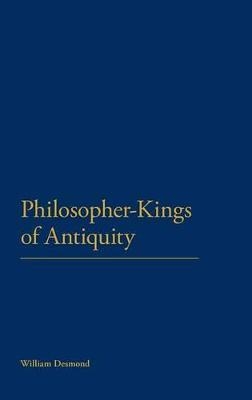
Philosopher-Kings of Antiquity
Seiten
2011
Continuum Publishing Corporation (Verlag)
978-0-8264-3475-3 (ISBN)
Continuum Publishing Corporation (Verlag)
978-0-8264-3475-3 (ISBN)
One of the most celebrated of Plato's ideas was that if human society was ever to function successfully then philosophers would need to become kings, or kings philosophers. In a perfect state, therefore, philosophic wisdom should be wedded to political power. This volume focuses on Plato and his contemporaries.
One of the most celebrated of Plato's ideas was that if human society was ever to function successfully then philosophers would need to become kings, or kings philosophers. In a perfect state, therefore, philosophic wisdom should be wedded to political power. In antiquity, who were or aspired to be philosopher-kings? What was their understanding of wisdom and the limits of knowledge? What influence have they had on periods beyond antiquity? This volume focuses on Plato and his contemporaries; Alexander the Great and his Hellenistic successors; Marcus Aurelius and the 'good emperors'; Moses, Solomon and early Hebrew leaders; and Julian the Apostate, the last of the pagans. In conclusion it looks at the re-emergence of the Platonic ideal in important moments of European history, such as the Enlightenment. The theme of the philosopher-king is significant for Greco-Roman antiquity as a whole, and this work is unique in detailing the development of an idea through major periods of Greek and Roman history, and beyond.
One of the most celebrated of Plato's ideas was that if human society was ever to function successfully then philosophers would need to become kings, or kings philosophers. In a perfect state, therefore, philosophic wisdom should be wedded to political power. In antiquity, who were or aspired to be philosopher-kings? What was their understanding of wisdom and the limits of knowledge? What influence have they had on periods beyond antiquity? This volume focuses on Plato and his contemporaries; Alexander the Great and his Hellenistic successors; Marcus Aurelius and the 'good emperors'; Moses, Solomon and early Hebrew leaders; and Julian the Apostate, the last of the pagans. In conclusion it looks at the re-emergence of the Platonic ideal in important moments of European history, such as the Enlightenment. The theme of the philosopher-king is significant for Greco-Roman antiquity as a whole, and this work is unique in detailing the development of an idea through major periods of Greek and Roman history, and beyond.
William Desmond completed his doctorate at Yale and he then taught at Yale before moving to Maynooth in 2007. His book The Greek Praise of Poverty. Origins of Ancient Cynicism (Notre Dame University Press) won the National University of Ireland Centennial Prize in 2008.
Introduction.; 1: Wisdom and power; 2: Plato's Republic and philosophical monarchism; 3: The 'philosopher in arms' - a Hellenistic ideal; 4: Marcus Aurelius, Stoic and emperor; 5: Moses, philosopher-king of the Hebrews; 6: Julian the Apostate, NeoPlatonic emperor; 7: The end of an ideal - philosopher-presidents and the poets' revenge.
| Erscheint lt. Verlag | 29.12.2011 |
|---|---|
| Verlagsort | New York |
| Sprache | englisch |
| Maße | 156 x 234 mm |
| Themenwelt | Geschichte ► Allgemeine Geschichte ► Vor- und Frühgeschichte |
| Geschichte ► Allgemeine Geschichte ► Altertum / Antike | |
| Geisteswissenschaften ► Geschichte ► Geschichtstheorie / Historik | |
| Geisteswissenschaften ► Philosophie ► Erkenntnistheorie / Wissenschaftstheorie | |
| ISBN-10 | 0-8264-3475-4 / 0826434754 |
| ISBN-13 | 978-0-8264-3475-3 / 9780826434753 |
| Zustand | Neuware |
| Haben Sie eine Frage zum Produkt? |
Mehr entdecken
aus dem Bereich
aus dem Bereich
auf den Spuren der frühen Zivilisationen
Buch | Hardcover (2023)
C.H.Beck (Verlag)
CHF 27,95
Konzepte – Methoden – Theorien
Buch | Softcover (2024)
UTB (Verlag)
CHF 55,85
Was Pompeji über uns erzählt
Buch | Hardcover (2023)
Propyläen (Verlag)
CHF 44,75


